Lesson 27: Healthcare and Technology
Attention
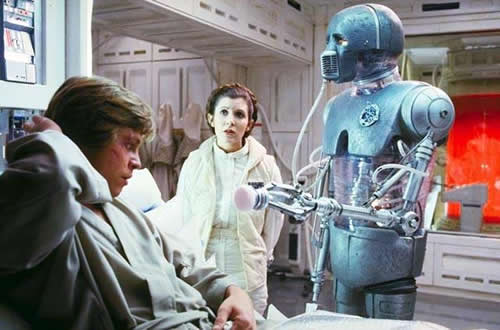
After Darth Vader (his father no less!!) lopped off Luke's hand a robot doctor replaced it...interesting was the dialogue between Luke and the robot which mimicked a patient doctor interaction. Will our robots become this personable someday?
Learning Outcomes
Upon completion of this lesson's material, students will be able to:
- Identify ways in which technology is impacting the culture of health care and other vocations.
- Identify ways in which schools can prepare people for the pace of change in technology.
Teaching
History and Technology
One of the challenges of living in this age is that technology changes very fast. In the past one could pretty much assume that most of the technology we watched our parents use is the same technology we will use. Farmers who watched their parents use a plow could pretty much assume that they would use a plow just like it when they became farmers. Preparing for the future was as simple as learning how to use the tools right in front of you. This is no longer the case!
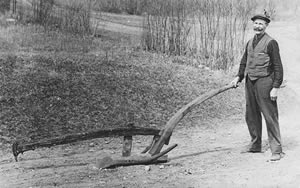
Technology does not only change from generation to generation, but it will change WHILE YOU ARE STILL USING IT! You can bank on the notion that while you are working in your respective fields, the technology that you used to use at the beginning will become outdated and new technology will be introduced.
How do you prepare for THAT?

We need to learn to be flexible and responsive...and most of all, WILLING to learn new tricks and new methods. We might not always LIKE it, but we are certainly going to have to adapt if we are going to keep up.
Click HERE to visit a fascinating site "The Quickening Pace of Technological Change: (c 1850-1900)
Medical Informatics: The Health Information Technology Decade
All these emerging technologies are changing the very idea of a medical record. If you look up images of a "medical record" in Google you get something like this:

This is slowly (perhaps, quickly) going away...to be replaced with devices like this...
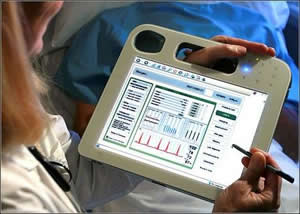
No doubt we can support the usefulness of this sort of record keeping...reduced errors, better communication between providers, etc. But who can get access to these records and since they are so portable (they can be sent across the street or around the world in second).
Clearly this initiative is coming first from the government and is being promoted across the country.
This is an emerging field of study. Not all the doctor's offices in the area are enthusiastic about the switch to a shared electronic system. Many have invested a lot of resources into developing their own practices which appeal to the unique qualities of the doctors themselves and their staff. To standardize is to give up some of that autonomy.
Have you ever had to change the way you did something because a new "standard" was introduced?
Information Resources: Computer-Assisted Instruction, Expert Systems, Health Information Online Electronic Age
One of the challenges of the "information age" or "electronic age" is that we have to become better consumers of information. We need to engage our critical thinking skills and evaluate the source of information that we get on the Web.

When I first started in college my access to information was very limited. It was centered in the college library (no computers) and often involved the help of a librarian well versed in steering me away from information that was not considered valid or academic. Under these circumstances pretty much anything I looked up or ordered (interlibrary loan to get an article we didn't have on campus) could be assumed to be a good source.
With as much information as we have at our fingertips now, we have to be careful consumers. For good and bad, no one really monitors what is posted on the Internet. Believe me, there is a lot of garbage out there...it may LOOK good, but it may still be garbage!
Click HERE to view a guide for evaluating websites published by the UC Berkeley.
Click HERE to view a set of guidelines for evaluating websites published by the Cornell University Library
Telemedicine
Living in a rural state, I have first-hand experience in telemedicine. Due to the logistics and remote quality of Maine, we are on the forefront in someways...by necessity.
Recently I was in the ER with a very sore sole of my foot and ankle. They took an x-ray to rule out any breaks or strains. The conversation was interesting because the ER doctor told me that I was lucky that I came in when I did. I was there in the morning and up until noon the x-rays are sent to Cincinnati (I can't remember the city, but it was something like that) and after noon they are sent overseas.
I was lucky because I would get the results right away from Cincinnati, but if I came in the afternoon I would have to wait several hours to get the results.

This is not really my foot...
I never met the radiologist that ruled out the break in my foot...and he/she never met me. I'm OK with that because I met the ER doctor.
From an access point of view, this seems to be a very positive development. Many individuals who have otherwise been unable to get care are able to. My family is from Canada and my mother, brother, and sister-in-law live in a pretty remote city in northern British Columbia. Despite the size of the city, many medical procedures need to be completed in Vancouver. So, when my sister-in-law developed breast cancer she had to fly to Vancouver for treatments.
I live in a much smaller city than they do and we have a cancer center right here.
I believe deeply in socialized medicine. Part of why medical care is so expensive in the US is that we have nearly every level of care available nearly everywhere. As a society we have become accustomed to being able to access most of what we need on a local basis. This will change if socialized medicine was ever to work in the US...there is simply not enough money to have all that technology everywhere. However, with the advent of telemedicine we might be able to concentrate services and deliver them through technology to an even wider audience.
Check out how this hospital has incorporated iPads into their Neonatal Intensive Care unit to keep Moms in touch with their infants by clicking HERE.
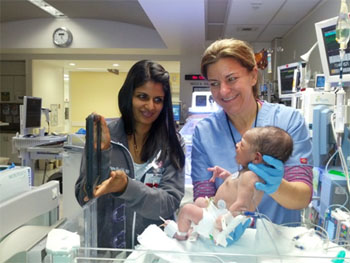
Information Technology in Public Health
I think we often forget about the impact that public health has on us. Vaccinations, school lunch programs, recreation, etc...all these contribute to our overall health and are created from policies that are informed by the statistics gathered on a grand scale.
We feel somewhat distanced from this because it is not "personal". Public health officials think in terms of large numbers, populations, entire cities and even countries. They also view nearly every aspect of a person's life as connected to health in one way or another.
Technology and Science Fiction
I have a great interest in the genre of Science Fiction writing. Some of my favorite authors have been not only good writers, but visionaries of the future! Asimov, Bradbury, Clark, Niven...each of these have incorporated visions of our interactions with technology (and in many cases, technology going wrong - 2001 A Space Odyssey, for example).
These visions, however, are very applicable to our understanding of the mind learning to deal with advanced technology. There are many who want to imbed human characteristics into machines so that we can feel more comfortable with them. Computer users, all of you, have benefited from the science of computer-human interface engineering.
On a computer there really is no such thing as a "trash can" (Mac) or a "recycle bin" (PC)...but these images help us to better relate to our computers. By creating analogies from our real world into the digital world of the operating system, users are easier to train and we become emotionally attached to our machines.
In his Adept series, Piers Anthony grapples with the notion of a "self-aware robot" and the human who falls in love with her.
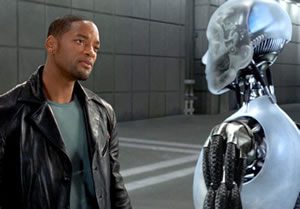
In this scene of "I Robot", Will Smith's character interrogates a very self-aware robot in this very good adaptation of Asimov's "I Robot" series.
Information Technology in Surgery - The Cutting Edge
This chapter really identifies the "cutting edge" in telemedicine. As fascinating as the robotics are, I am very interested in nanotechnology and the potential of the very small.
Another science fiction reference might be the classic sci-fi B-movie "Fantastic Voyage" which depicts scientists shrunk down to a very small size and being injected into a human body to cure a patient of cancer.
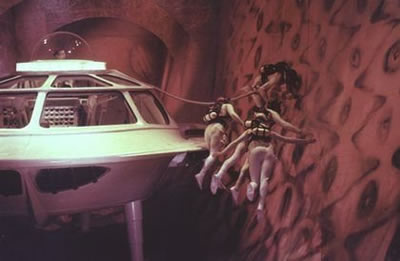
In this scene the scientists have left their vessel and are exploring tissue...I've always wondered how the lit up the inside of the patient, but heck, it's a B-movie, we don't ask questions like that!
Imagine what tiny robots circulating in our system might be able to do for inoperable cancers? Would there really be anything that we could not access?
Assessment
Lesson 27 Quiz
- Reflect on the emerging technological changes related to your field of work (or the one you anticipate being in). Do you feel you were well prepared for these changes?
- How do you think schools should prepare students for unknown technological advances in the future?